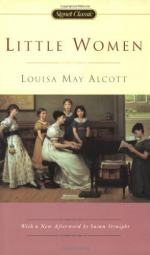Nobody knew where the evening went to, for Hannah skillfully abstracted the babies at an early hour, nodding like two rosy poppies, and Mr. Laurence went home to rest. The others sat round the fire, talking away, utterly regardless of the lapse of time, till Meg, whose maternal mind was impressed with a firm conviction that Daisy had tumbled out of bed, and Demi set his nightgown afire studying the structure of matches, made a move to go.
“We must have our sing, in the good old way, for we are all together again once more,” said Jo, feeling that a good shout would be a safe and pleasant vent for the jubilant emotions of her soul.
They were not all there. But no one found the words thougtless or untrue, for Beth still seemed among them, a peaceful presence, invisible, but dearer than ever, since death could not break the household league that love made disoluble. The little chair stood in its old place. The tidy basket, with the bit of work she left unfinished when the needle grew ‘so heavy’, was still on its accustomed shelf. The beloved instrument, seldom touched now had not been moved, and above it Beth’s face, serene and smiling, as in the early days, looked down upon them, seeming to say, “Be happy. I am here.”
“Play something, Amy. Let them hear how much you have improved,” said Laurie, with pardonable pride in his promising pupil.
But Amy whispered, with full eyes, as she twirled the faded stool, “Not tonight, dear. I can’t show off tonight.”
But she did show something better than brilliancy or skill, for she sang Beth’s songs with a tender music in her voice which the best master could not have taught, and touched the listener’s hearts with a sweeter power than any other inspiration could have given her. The room was very still, when the clear voice failed suddenly at the last line of Beth’s favorite hymn. It was hard to say . . .
Earth hath no sorrow that heaven cannot heal;
and Amy leaned against her husband, who stood behind her, feeling that her welcome home was not quite perfect without Beth’s kiss.
“Now, we must finish with Mignon’s song, for Mr. Bhaer sings that,” said Jo, before the pause grew painful. And Mr. Bhaer cleared his throat with a gratified “Hem!” as he stepped into the corner where Jo stood, saying . . .
“You will sing with me? We go excellently well together.”
A pleasing fiction, by the way, for Jo had no more idea of music than a grasshopper. But she would have consented if he had proposed to sing a whole opera, and warbled away, blissfully regardless of time and tune. It didn’t much matter, for Mr. Bhaer sang like a true German, heartily and well, and Jo soon subsided into a subdued hum, that she might listen to the mellow voice that seemed to sing for her alone.
Know’st thou the land where the citron blooms,
used to be the Professor’s favorite line, for ‘das land’ meant Germany to him, but now he seemed to dwell, with peculiar warmth and melody, upon the words . . .




